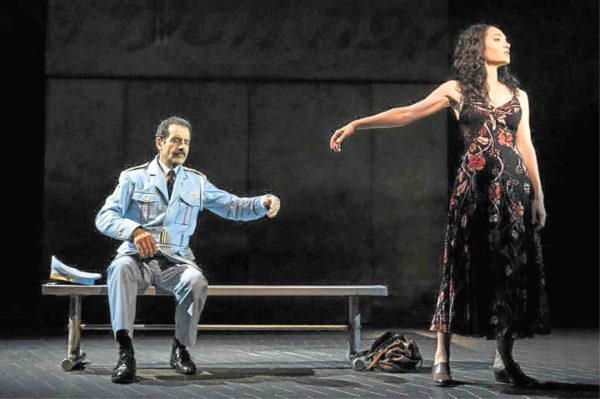
Tony Shalhoub (left) and Katrina Lenk in “The Band’ s Visit”
NEW YORK—Our show schedule is a little strange. Normally, shows on Broadway would run from Tuesday to Sunday, with Monday as day off, or from Monday to Saturday with Sunday off.
However, “Once on This Island” runs from Friday to Wednesday, which makes Thursday our day off. This makes me happy because it means I can watch a lot of other shows, whether on or off Broadway.
Last Thursday, with my manager Josh Pultz and his partner Ted Malawer, we headed to The Ethel Barrymore on West 47th, to watch a musical that opened this season to much critical acclaim: “The Band’s Visit” with Katrina Lenk (Dina) and Tony Shalhoub (Tewfiq) leading a remarkable and monstrously talented ensemble of actors and musicians.
Based on the 2007 film of the same name written and directed by Eran Kolirin, “The Band’s Visit” is about the travels of the Alexandria Ceremonial Band, set to perform at the Arab Cultural Centre in Petah Tikva. However, due to a transport mix-up, the band ends up instead in the sleepy little town of Bet Hatikva (read both names aloud, and you’ll see where the confusion lies), and once they arrive, they’re stuck, as there are no buses out until the following morning.
A few of the inhabitants thus extend their own brand of hospitality for the night, opening their homes and themselves to the eight-member band, letting them in on their hopes, disappointments, loves and losses.
There is the story of the unhappy café owner who hasn’t seen her husband in years, and is having an affair with a married man … of a couple with a small child in an unhappy marriage … a widower reliving the day he met his now dead wife … a teenager unable to express how he feels to the girl he likes … and a young man, waiting faithfully at the phone booth for his girlfriend to call.
Lenk, last seen on Broadway in Paula Vogel’s play “Indecent,” is incandescent, her face transparent, allowing her emotions to write themselves on her face. On one hand, she is stoic, defensive and hardened, and on another, open and vulnerable.
Tony Shalhoub, best known for playing the title character in the long-running American series “Monk,” is formal as the band’s conductor, but through his eyes, we see the immense loss Tewfiq has experienced with the absence of his wife and son. In these two is romance, beautiful and maybe even fulfilling, albeit unconsummated.
The rest of the company is rich not only in talent, but humor and heart. George Abud as Camal, forever with an unlit cigarette in his mouth, dazzles as both an actor and musician (he is a virtuoso on that violin). Ari’el Stachel as the would-be lothario Haled, who asks just about every person in town if they’ve heard of Chet Baker, is funny and sweet, as well as sexy.
Adam Kantor as Telephone Guy has a voice that reaches into and rewires your heart, and you root for him hoping as hard as he does for that phone to ring. And John Cariani (Itzik), Daniel David Stewart (Papi), Andrew Polk (Avrum), Bill Army (Zelger), Rachel Prather (Julia), Jonathan Raviv (Sammy), Sharone Sayegh (Anna), Kristen Sieh (Iris) and Alok Tewari (Simon) turn in such touching performances, making you laugh one minute, and cry the next.
The onstage musicians (Ossama Farouk, Sam Sadigursky, Harvey Valdes and Garo Yellin) are rock stars. My jaw kept hitting the floor in disbelief at their musicianship and unity.
David Yazbek’s music and Itamar Moses’ book strike a beautiful chord, the show’s unhurried stride allowing us all to experience the slowness of this town, and the pace at which these people’s lives are lived. It blows like the gentlest of breezes, behaving like a play that happened to have its cast occasionally bursting into song.
I would be remiss if I didn’t mention the elephant in the room, the political ramifications of a piece like this.
In this small Israeli town, Arabs and Jews are face-to-face, each tentative in their initial contact with one another.
By the end, when the cast is singing “Answer Me,” many of us in the audience, aware of how Palestine and Israel are portrayed in the news—how they seem to have such hatred for one another—were caught off-guard by the relationships of the characters in this show.
If at the start there was tension and guardedness, by the end, there is empathy, understanding and the discovery of common ground, a shared consciousness of life and its experiences. There is an unseen reaching across enemy lines, a decision to build a bridge across the gulf.
This is going to sound awfully naïve, but I do fervently wish that life would imitate art, if only for a little while.
My most heartfelt congratulations to everyone involved in this gem of a show. (Director is David Cromer; musical director, Andrea Gordy; and choreographer, Patrick McCollum.) I think I’ll have to pay Bet Hatikva another visit very soon.